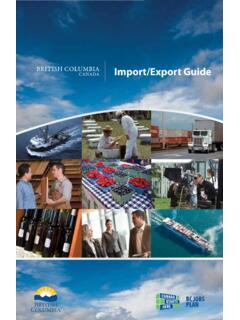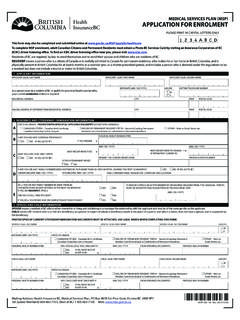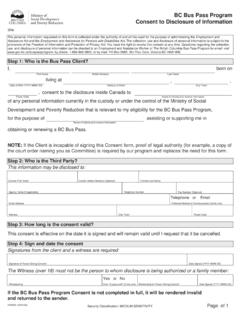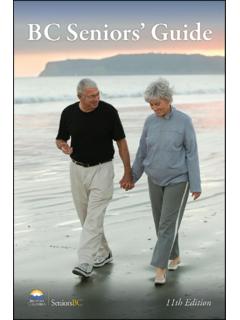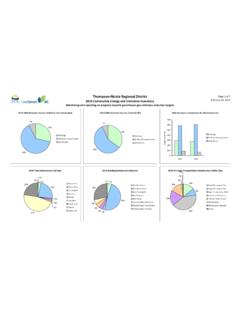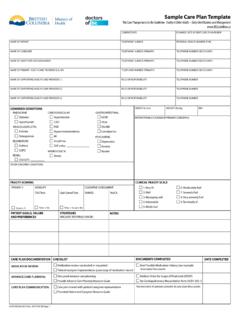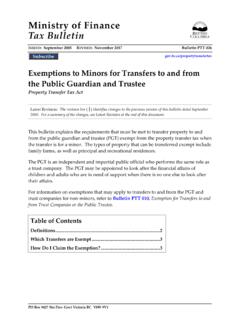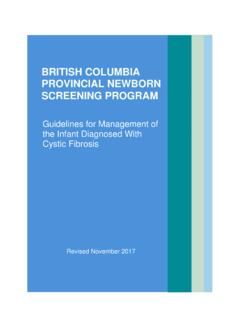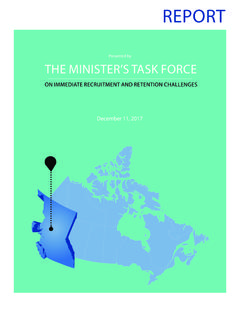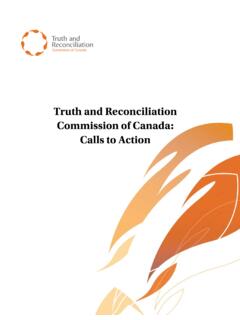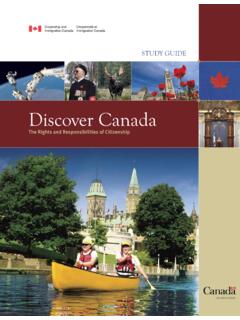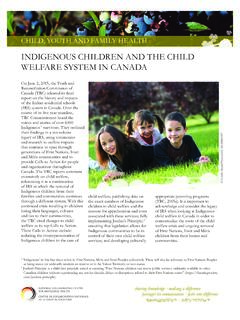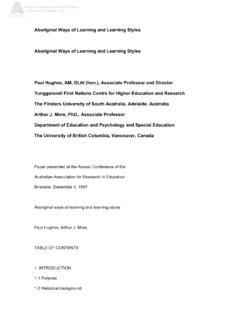Transcription of Aboriginal Worldviews and Perspectives in the Classroom
1 Aboriginal Worldviews and Perspectives in the ClassroomMoving ForwardQueen s Printer for British Columbia Victoria7610003550To purchase additional copies order online at: additional information contact us at: Crown Publications, Queen s PrinterToll Free: 1-800-663-6105 Email: Worldviews and Perspectives in the ClassroomMoving ForwardCopyright 2015 Province of British Columbia. All rights material is owned by the Government of British Columbia, or reproduced with permission, and protected by copyright law. It may not be reproduced or redistributed without the prior written permission of the Province of British Columbia and/or the copyright owner.
2 To request permission to reproduce all or part of this material, please complete the Copyright Permission Request Form at w w c .c a /com /co p y/re q /.Limited Exception to Non-ReproductionPermission to copy and use this publication in part, or in its entirety, for non-profit educational purposes within British Columbia and Yukon Territory, or by explicit permission of the Minister of Education, is granted to (a) all staff of British Columbia boards of education and independent school authorities and other parties providing, directly or indirectly, educational programs to students or registered children as identified by the School Act, 1996, , or the Independent School Act, 1996, , and (b) all staff of a school operated by First Nation or treaty First Nation.
3 Or (c) a party providing, directly or indirectly, educational programs under the authority of the Minister of the Department of Education for Yukon Territory as defined in the Education Act, 2002, 978-0-7726-6928-5iAboriginal Worldviews and Perspectives in the Classroom : Moving ForwardThe inspiration for this project was to support and build upon a regional dialogue that would lead to further strategies and clear commitments from all educators as we work to serve each learner, families, and communities. With a spirit of collaboration, a commitment to transformation, and an If not here, where? mindset, we approached Director Ted Cadwallader of the British Columbia Ministry of Education to share our School District 85 (Vancouver Island North) aspirations.
4 Shortly thereafter, the vision and partnership was expanded to include four other school districts to host focus sessions on Aboriginal Worldviews and Perspectives in the efforts have been inspired by regional First Nations leadership and the many courageous Nino gad (Knowledge Keepers), warriors, and thinkers that are at the forefront of transformation and changing paradigms. In addition to finding our way locally, we are guided by influential works such as the United Nations Declaration on the Rights of Indigenous Peoples, the Final Report of the Truth and Reconciliation Commission of Canada (2015), the Report of the Royal Commission on Aboriginal Peoples (1996), and the First Peoples Principles of Learning (2008 see the Introduction to this document for details).
5 The themes that emerged across territories and communities inspire a call to action. New constructs for leadership, Indigenous pedagogical practices, Aboriginal Perspectives and content, and a vision for decolonizing mindsets were among the wealth of ideas expressed as to how we move forward both individually and collectively. It is our responsibility to sustain this conversation and to make commitments to ensure that we are successful. Commissioner Murray Sinclair of the Truth and Reconciliation Commission of Canada stated that, We have to start addressing the way that we teach our children about Aboriginal people . The Commission has identified the role of leadership and education as the way forward.
6 We acknowledge the British Columbia Ministry of Education for its leadership and courage in facilitating the regional sessions. We salute those named in the Acknowldgements of this document who made the sessions a reality in their regions and extended the conversation across the province. We acknowledge as well all the organizations and individuals who helped make our own SD 85 session a successful and inspiring event the First Nations Education Council, the Kwakiutl Nation (regional session host), leaders at the district and school levels, teachers, support staff, students, Chiefs, Elders, community members, post-secondary institutes and agency Child and Scott BenwellForeword: A Vision for Aboriginal EducationiiiAboriginal Worldviews and Perspectives in the Classroom .
7 Moving ForwardThe Ministry of Education would like to thank all those who participated in the Gatherings that gave rise to the vision set out in this document. We are grateful to each Aboriginal community that graciously hosted these events and participated in the dialogue in collaboration with local school districts: Tsaxis (SD 85); Burnaby (SD 41); Williams Lake (SD 27); ?Aq am (SD 5); and, West Kelowna (SD 23).Leadership provided the vision for the day, but the outcomes of this project stem from the extensive voices of community. This diversity included hereditary Chiefs, elected Chiefs and Councils, Elders, Aboriginal support staff members, community agencies, students, teachers, school district staff members, principals, vice-principals, school trustees, post-secondary institutes, and other partners.
8 The Ministry would also like to acknowledge those who helped set the context, guide discussion, and record the input of participants at each of the regional Facilitation TeamKaleb Child, District Principal, First Nations, SD 85 Ted Cadwallader, Ministry of Education ( Aboriginal Education)Sarah Cormode, Ministry of Education ( Aboriginal Education)Elanna Eagle, Ministry of Education ( Aboriginal Education)Bernard Gobin, GT Publishing Services Hill, Ministry of Education ( Aboriginal Education)Gail Hughes-Adams, Ministry of Education ( Aboriginal Education)Norma Ritchie, Ministry of Education ( Aboriginal Education)First Nations Education Steering Committee RepresentativesJo-Anne ChronaStarleigh GrassRepresentatives from the Ministry Curriculum Team Brent MunroNick PoeschekLaura HawkesMelissa HornerMost of the photos used in this document were captured by the facilitation team.
9 Special thanks, however is extended to Shelley Janvier, on staff with SD 41 (Burnaby), who captured and shared the photos used on pages 2, 13, 29, 51, 60, and , the Ministry would like to thank GT Publishing Services Ltd. for assistance in developing this document (editorial: Bernard Gobin; design: Barry Millar).AcknowledgmentsvAboriginal Worldviews and Perspectives in the Classroom : Moving ForwardForeword: A Vision for Aboriginal Education ..iAcknowledgments ..iiiIntroduction ..1 The Engagement Process ..5 The Agenda and Approach for the Gatherings ..6 The Creation of this Document ..7 Aboriginal Education for All Learners.
10 11 Characteristics of Aboriginal Worldviews and Perspectives ..15 Connectedness and Relationship ..16 Awareness of History ..18 Local Focus ..22 Engagement with the Land, Nature, the Outdoors ..24 Emphasis on Identity ..26 Community Involvement: Process and Protocols ..28 The Power of Story ..30 Traditional Teaching ..32 Language and Culture ..34 Experiential Learning ..36 Attributes of Responsive Schooling ..39 The Role of the Teacher ..40 Community Engagement ..42 Teacher Preservice Training and Inservice Professional Development ..44A Positive, Learner-Centred Approach ..48 Leadership and Staffing ..52 Flexibility in Scheduling, Grouping, and Program Configuration.
